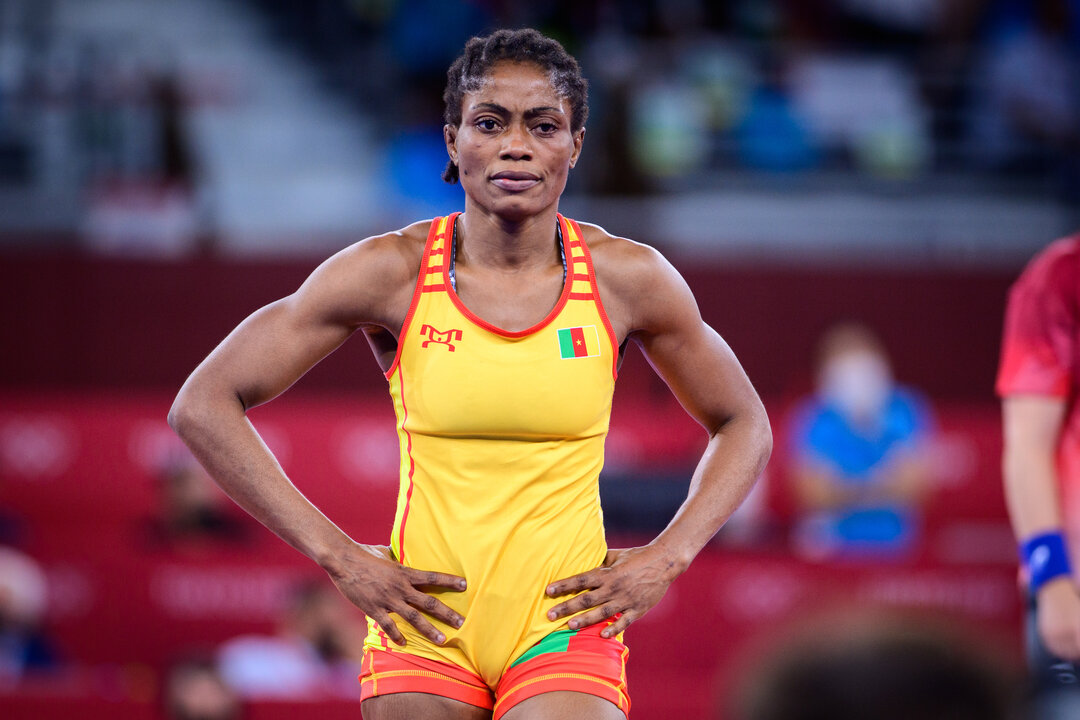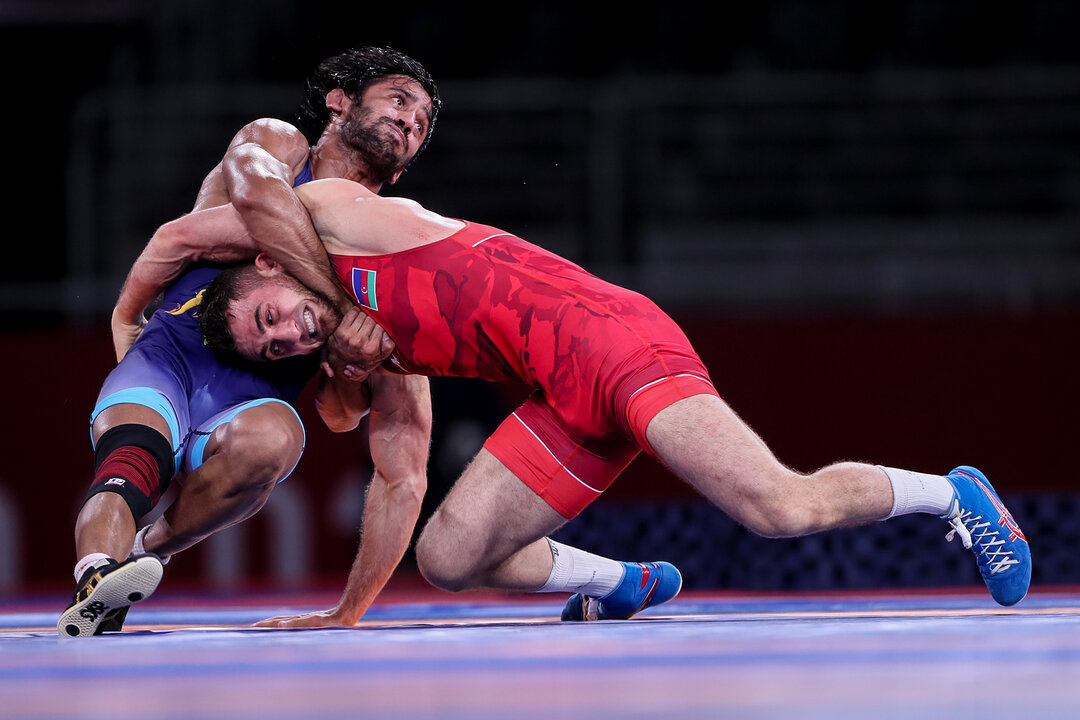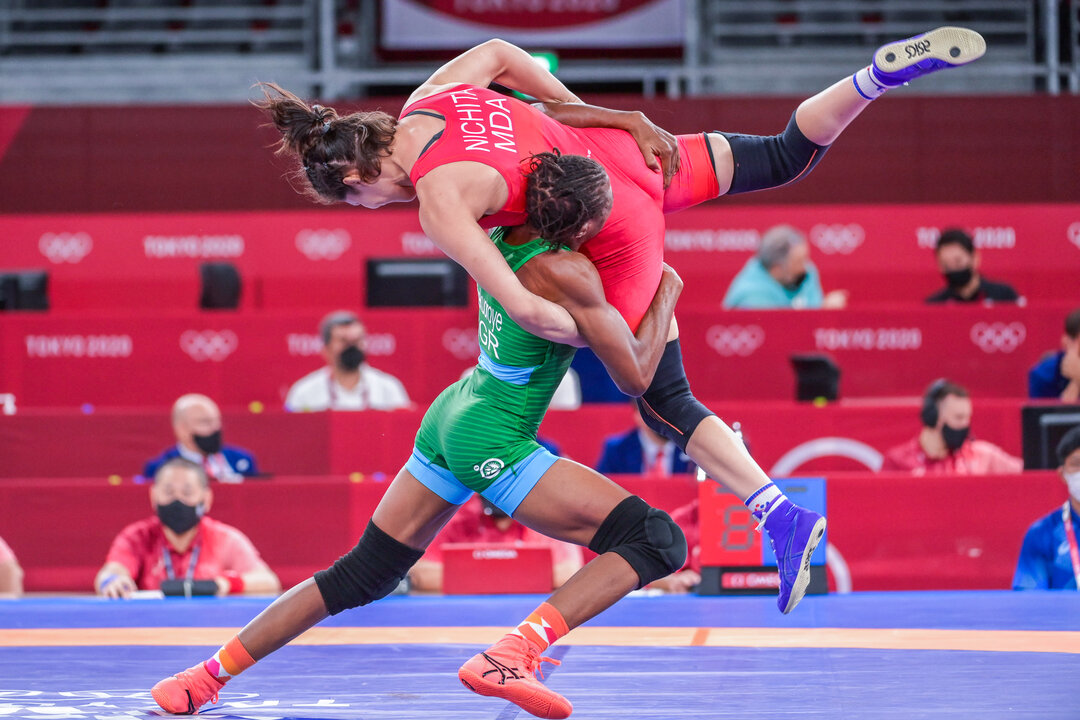Ravi, Punia, Oborududu headline this week’s Commonwealth Games
Monday, August 1, 2022 - 11:30 By Eric Olanowski

BIRMINGHAM, England (August 1) --- Some of wrestling’s biggest freestyle and women’s wrestling stars will be headed to Birmingham, England this week, as the 21st edition of wrestling at the Commonwealth Games gets underway August 5-6.
The stacked entry list includes 14 returning medalists – five of which are looking for back-to-back Commonwealth Games golds. But the list is headlined by superstars Kumar RAVI (IND) Bajrang PUNIA (IND) and Blessing OBORUDUDU (NGR).
Oborududu and Ravi won silver medals at the Tokyo Olympic Games, while Punia claimed bronze.
Ravi will be making his first appearance at the prestigious Commonwealth Games, while Oborududu and Bajrang will be looking to reach the top of the podium for a second consecutive time.
On the freestyle side of the competition, outside of Ravi and Bajrang, the list of seven returning medalists is headlined by 2018 CWG champ Muhammad INAM (PAK) who’ll compete at 86kg.
Lightweight star Ravi will wrestle at the Olympic weight of 57kg in England after he’s jumped between 57kg and 61kg at the Yasar Dogu, Dan Kolov and Asian Championships. This season, the 25-year-old product from the wrestling powerhouse state of Haryana has a 12-1 record. He’s won golds at the Yasar Dogu Ranking Series event and Asian championship and settled for Dan Kolov silver after falling to Zelimkhan ABAKAROV (ALB), 7-1, in the gold-medal match.
His biggest competition in England will be Ebikewenimo WELSON (NGR). The 30-year-old has represented Nigeria at the CWG at every Games since 2010 and has finished with two silvers and a bronze, with the latter coming in 2018.
At 65kg, Bajrang walks into Birmingham as the unquestionable favorite to win the gold. India’s first-ever three-time world medalist will likely have to get past the 12-man bracket’s lone returning CWG medalist in Amas Daniel (NGR). It’ll be Daniel’s fourth straight appearance wrestling at the CWG, where he’s finished with two bronze medals and had a fourth-place finish in 2010.
Muhammad Inam (PAK) is the third returning freestyle champion in action. His biggest competitor at 86kg will be one of the world’s fastest rising stars in Deepak PUNIA (IND)
Punia announced his presence on the senior circuit at the 2019 World Championships, where he stormed past the field to reach the finals and punch India ticket to the Olympic Games. In Tokyo, Punia led Myles AMINE (SMR) in the bronze-medal match but surrendered a last-second takedown and settled for fifth place in Tokyo.
Another guy who could stir up the pot at 86kg is Syerus Eslami (ENG). He’ll be looking to improve on his bronze-medal in front of a friendly English crowd.
In women’s wrestling, there will be stars galore.
Vinesh VINESH (IND), Odunayo ADEKUOROYE (NGR) and Oborududu are the trio of returning champs eying a shot at adding their name to the short list of Commonwealth Games two-timers.
Vinesh will return to the mat for the second time since her emotional toll-taking Tokyo Olympic exit which resulted in a ninth-place finish. After taking four months off, she returned to action at the Yasar Dogu Ranking Series event and finished in fifth place. Her pair of losses came at the hands of Jacarra WINCHESTER (USA) and Ekaterina ISAKOVA (RWF).
Vinesh’s biggest threat will likely be Canada’s Samantha STEWART (CAN). If the two meet, it’ll be a rematch from the 2021 Matteo Pellicone Ranking Series event semifinals where the Indian picked up the fall via cradle 42 seconds into the first period.
 Tokyo fifth-place finisher Joseph ESSOMBE TIAKO (CMR) is on a quest to become Cameroon's first-ever Commonwealth Games champion. (Photo: Kadir Caliskan)
Tokyo fifth-place finisher Joseph ESSOMBE TIAKO (CMR) is on a quest to become Cameroon's first-ever Commonwealth Games champion. (Photo: Kadir Caliskan)
At 57kg, there are three tier one wrestlers who should vie for the gold medal. Most people expect to see returning champion Adekuoroye or 2021 world silver Anshu Anshu (IND) in the finals, but Joseph ESSOMBE TIAKO (CMR) is a wrestler who could stop the highly anticipated bout between the Nigerian and Indian.
Coming into Birmingham, Cameroon is 0-3 in gold-medal matches. Essombe Tiako is looking to rewrite the history books as she moves up to 57kg from her Tokyo Olympic fifth-place weight of 53kg.
There’s no secret that Oborududu headlines the 68kg women’s field. The Olympic runner-up and returning CWG champion will likely have to stop Divya KAKRAN (IND) if she wants to join Adekuoroye and Adeniyi OLUWAFUNMILAYO (NGR) as Nigeria’s only two-time CWG women’s wrestling winners.
Follow United World Wrestling on all social media channels for live updates from the Commonwealth Games.
 Bajrang PUNIA (IND) is one of three Tokyo Olympic medalists that'll be in action in Birmingham. (Photo: Kadir Caliskan)
Bajrang PUNIA (IND) is one of three Tokyo Olympic medalists that'll be in action in Birmingham. (Photo: Kadir Caliskan)
Freestyle returning medalist::
57kg - Ebikewenimo Welson (NGR) – bronze
65kg - Bajrang Bajrang (IND) – gold
65kg - Amas Daniel (NGR) – bronze
74kg - Curtis Dodge (WAL) - bronze
74kg - Charlie Bowling (ENG) -– bronze
86kg - Muhammad Inam (PAK) – gold
86kg - Syerus Eslami (ENG) – bronze
Women’s wrestling returning medalist:
50kg Miesinnei Mercy Genesis (NGR) – bronze
53kg - Vinesh Vinesh (IND) – gold
57kg - Odunayo Folasade Adekuoroye (NGR) – gold
62kg - Sakshi Malik (IND) - bronze
68kg - Blessing Oborududu (NGR) – gold
68kg - Divya Kakran (IND) – bronze
76kg - Georgina Nelthorpe (ENG) – bronze
Freestyle
57kg
Ebikewenimo Welson (NGR)
Romio Ricardo Goliath (NAM)
Ravi Kumar (IND)
Darthe Capellan (CAN)
Justin Holland (AUS)
Suraj Singh (NZL)
Ali Asad (PAK)
Harvey Ridings (ENG)
Jakobo Tanki Tau (RSA)
Gary Giordmaina (MLT)
65kg
Amas Daniel (NGR)
Jason Shannon Afrikaner (NAM)
Bajrang Bajrang (IND)
Lowe Bingham (NRU)
Jean Guyliane Joris Bandou (MRI)
Lachlan Mcneil (CAN)
Mostafa Rezaeifar (AUS)
Brahm Richards (NZL)
George Ramm (ENG)
Inayat Ullah (PAK)
ROSS CONNELLY (SCO)
Adam Vell12a (MLT)
74kg
Ogbonna Emmanuel John (NGR)
Mathayo Matonya Mahabila (KEN)
Mohamed Sesay (SLE)
Jasmit Singh Phulka (CAN)
Hong Yeow Lou (SGP)
Cole Hawkins (NZL)
Thorn Demeritte (BAH)
Charlie Bowling (ENG)
Muhammad Sharif Tahir (PAK)
Arno Van Zijl (RSA)
NICOLAE COJOCARU (SCO)
Curtis Dodge (WAL)
Shanith Yoda Pedige (SRI)
Jacob Ntuyo (UGA)
Naveen Naveen (IND)
John Vake (TGA)
86kg
Ekerekeme Agiomor (NGR)
Lesyan Cousin Otomuro (JAM)
Abdur Roshid Hawladar (BAN)
Sheku Kassegbama (SLE)
Deepak Punia (IND)
Jean Frederic Marianne (MRI)
Alexander Moore (CAN)
Weng Luen Gary Chow (SGP)
Jayden Lawrence (AUS)
Taitaifono Tamati (SAM)
Matthew Oxenham (NZL)
Syerus Eslami (ENG)
Muhammad Inam (PAK)
Edward Lessing (RSA)
KIERAN MALONE (SCO)
Suresh Warnakulasuriya Fernando (SRI)
CHARALAMPOS CHOIRAS (CYP)
97kg
Nishan Randhawa (CAN)
Thomas Barns (AUS)
Maulalo Willie Alofipo (SAM)
Rashji Mackey (BAH)
Tayab Raza Awan (PAK)
CAMERON NICOL (SCO)
Sione Sika (TGA)
Nicolaas De Lange (RSA)
Deepak Deepak (IND)
125kg
Aaron Johnson (JAM)
Liton Biswas (BAN)
Mohamed Bundu (SLE)
Kensley Anthony Marie (MRI)
Mohit Mohit (IND)
Amarveer Dhesi (CAN)
Mandhir Kooner (ENG)
Zaman Anwar (PAK)
Aaron Lehauli (TGA)
ALEXIOS KAOUSLIDIS (CYP)
 Odunayo Adekuoroye (NGR) is looking to become a three-time Commonwealth Games champion. She'll compete at 57kg. (Photo: Kadir Caliskan)
Odunayo Adekuoroye (NGR) is looking to become a three-time Commonwealth Games champion. She'll compete at 57kg. (Photo: Kadir Caliskan)
Women’s Wrestling
50kg
Rebecca Ndolo Muambo (CMR)
Madison Parks (CAN)
Miesinnei Mercy Genesis (NGR)
CHRISTELLE LEMOFACK LETCHIDJIO (SCO)
Shriyanthika Niroshani Sinhala Pedige (SRI)
Pooja Gehlot (IND)
53kg
Mercy Bolafunoluwa Adekuoroye (NGR)
Vinesh Vinesh (IND)
Samantha Stewart (CAN)
Chamodya Keshani Maduravalage Don (SRI)
57kg
Odunayo Folasade Adekuoroye (NGR)
Joseph Emilienne Essombe Tiako (CMR)
Zainab Barrie (SLE)
Anshu Anshu (IND)
Veronica Ayo (UGA)
Sophia Omutichio Ayieta (KEN)
Hannah Taylor (CAN)
Danielle Sue Ching Lim (SGP)
Irene Symeonidis (AUS)
Shannon Harry (WAL)
Nethmi Poruthotage (SRI)
62kg
Esther Omolayo Kolawole (NGR)
Berthe Emilienne Etane Ngolle (CMR)
Dola Khatun (BAN)
Ana Godinez Gonzalez (CAN)
Kelsey Barnes (ENG)
ABBIE FOUNTAIN (SCO)
Sachini Weraduwage (SRI)
Sakshi Malik (IND)
68kg
Blessing Oborududu (NGR)
Blandine Nyeh Ngiri (CMR)
Tithy Roy (BAN)
Divya Kakran (IND)
Amylee Sephora Aza (MRI)
Linda Morais (CAN)
Sarah Clossick (ENG)
Chloe Spiteri (ENG)
Tiger Lily Cocker Lemalie (TGA)
TAYLA FORD (NZL)
76kg
Hannah Amuchechi Rueben (NGR)
Madusu Koroma (SLE)
Marie Celeste Andrea Vilbrun (MRI)
Justina Di Stasio (CAN)
Naomi De Bruine (AUS)
Michelle Montague (NZL)
Georgina Nelthorpe (ENG)
Pooja Pooja (IND)


 Arsen HARUTYUNYAN (ARM) battles Zelimkhan HARUTYUNYAN (ALB) in the 61kg semifinal. (Photo: United World Wrestling / Kadir Caliskan)
Arsen HARUTYUNYAN (ARM) battles Zelimkhan HARUTYUNYAN (ALB) in the 61kg semifinal. (Photo: United World Wrestling / Kadir Caliskan) Mahamedkhabib KADZIMAHAMEDAU (UWW) hits a cradle throw on Artur NAIFONOV (UWW) in their 86kg semifinal during the European Championships. (Photo: United World Wrestling / Kadir Caliskan)
Mahamedkhabib KADZIMAHAMEDAU (UWW) hits a cradle throw on Artur NAIFONOV (UWW) in their 86kg semifinal during the European Championships. (Photo: United World Wrestling / Kadir Caliskan)
Share your thoughts.
Comments